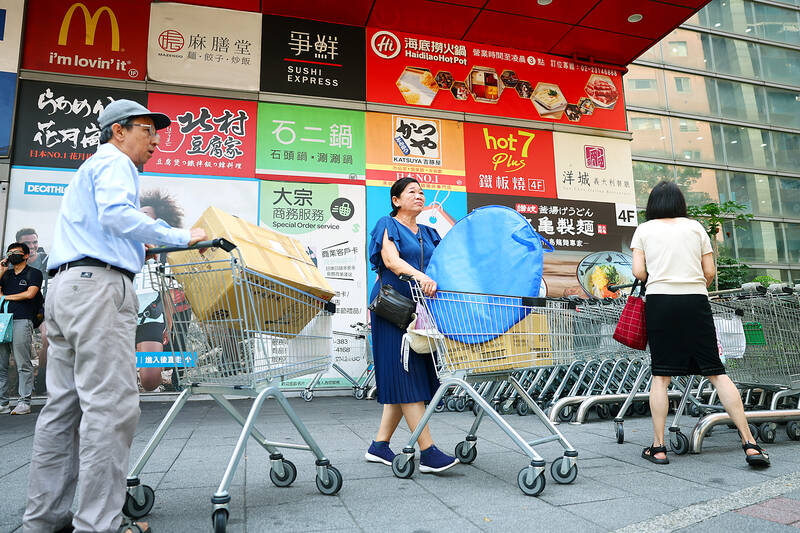Business sentiment in the local manufacturing sector last month fell for the first time in six months amid weakening global end-user demand, the Taiwan Institute of Economic Research (TIER, 台經院) said.
Data compiled by TIER, one of Taiwan’s leading economic think tanks, showed that the composite index gauging business sentiment in the local manufacturing sector last month fell 2.06 points from a month earlier to 91.08.
The decline broke a five-month streak of rising business sentiment, TIER said.

Photo: CNA
Last month, global demand from end-users remained weak, as demand from China in the post COVID-19 era failed to meet the market’s previous expectations, TIER said, adding that under such circumstances, export-oriented Taiwanese manufacturers continued to face inventory adjustments and turned cautious about their operations.
Taiwan’s exports and export orders fell for the eighth month in a row, slumping 13.3 percent and 18.1 percent respectively from the same month last year.
Gordon Sun (孫明德), director of TIER’s Economic Forecasting Center, said that business sentiment among local manufacturers is a leading indicator of economic health.
The preceding five months of increased optimism signaled a positive sign for the near future, with last month’s turnaround representing turbulence on the way toward stabilization of Taiwan’s manufacturing sector, Sun said.
In addition to falling global demand, the decline in Taiwan’s outbound sales and export orders in the past several months also reflected a relatively high comparison base over the same period last year, but the worst could end over the next one to two months, he said.
TIER said a survey showed that only 9.8 percent of respondents in the local manufacturing sector thought their operations improved in the previous month, down sharply from 30.7 percent when asked a month earlier, while 46.4 percent agreed that their business deteriorated last month, up from 21.6 percent in March.
This month’s survey showed that 27.3 percent believed business would improve over the next six months, compared with 21.2 percent in the poll conducted last month, while 24.5 percent thought that their operations would deteriorate over the next six months, compared with 24.3 percent last month, TIER said.
TIER president Chang Chien-yi (張建一) said that while many exporters in Taiwan believed their inventory levels were declining, they remained worried that high global inflation would continue to hurt demand.
TIER’s composite index assessing business sentiment in the local service sector last month fell 0.54 from a month earlier to 98.56.
Many retailers remained optimistic about their business in the wake of rising consumption in the post-COVID-19 pandemic era, the institute said.
The fall in the service sector’s composite index was minor, Chang added.
The government was keen to push for public work projects to boost domestic demand, but Taiwan’s economy remained at the mercy of external factors, such as global demand, he said.
Chang said that the nation would have to “work very hard” to push its GDP growth to 2 percent this year.

Intel Corp chief executive officer Lip-Bu Tan (陳立武) is expected to meet with Taiwanese suppliers next month in conjunction with the opening of the Computex Taipei trade show, supply chain sources said on Monday. The visit, the first for Tan to Taiwan since assuming his new post last month, would be aimed at enhancing Intel’s ties with suppliers in Taiwan as he attempts to help turn around the struggling US chipmaker, the sources said. Tan is to hold a banquet to celebrate Intel’s 40-year presence in Taiwan before Computex opens on May 20 and invite dozens of Taiwanese suppliers to exchange views

Application-specific integrated circuit designer Faraday Technology Corp (智原) yesterday said that although revenue this quarter would decline 30 percent from last quarter, it retained its full-year forecast of revenue growth of 100 percent. The company attributed the quarterly drop to a slowdown in customers’ production of chips using Faraday’s advanced packaging technology. The company is still confident about its revenue growth this year, given its strong “design-win” — or the projects it won to help customers design their chips, Faraday president Steve Wang (王國雍) told an online earnings conference. “The design-win this year is better than we expected. We believe we will win

Chizuko Kimura has become the first female sushi chef in the world to win a Michelin star, fulfilling a promise she made to her dying husband to continue his legacy. The 54-year-old Japanese chef regained the Michelin star her late husband, Shunei Kimura, won three years ago for their Sushi Shunei restaurant in Paris. For Shunei Kimura, the star was a dream come true. However, the joy was short-lived. He died from cancer just three months later in June 2022. He was 65. The following year, the restaurant in the heart of Montmartre lost its star rating. Chizuko Kimura insisted that the new star is still down

While China’s leaders use their economic and political might to fight US President Donald Trump’s trade war “to the end,” its army of social media soldiers are embarking on a more humorous campaign online. Trump’s tariff blitz has seen Washington and Beijing impose eye-watering duties on imports from the other, fanning a standoff between the economic superpowers that has sparked global recession fears and sent markets into a tailspin. Trump says his policy is a response to years of being “ripped off” by other countries and aims to bring manufacturing to the US, forcing companies to employ US workers. However, China’s online warriors